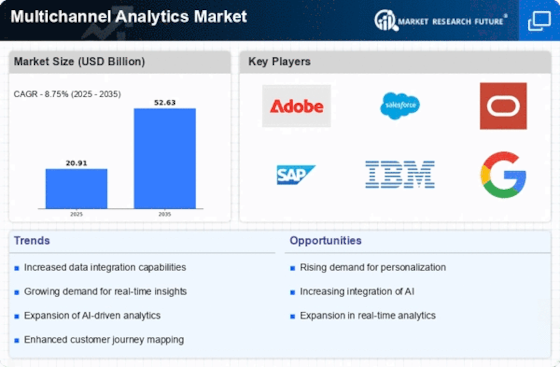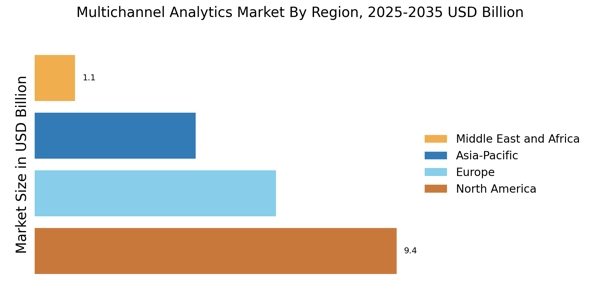Advancements in Technology and Tools
Technological advancements are playing a pivotal role in shaping the Multichannel Analytics Market. The emergence of sophisticated analytics tools, powered by artificial intelligence and machine learning, is enabling organizations to process and analyze data more efficiently. These innovations allow for deeper insights into customer behavior and preferences, which are crucial for tailoring marketing strategies. The market for analytics tools is projected to reach a valuation of over 100 billion dollars by 2026, reflecting the growing reliance on technology in analytics. As businesses seek to harness the power of data, the demand for advanced multichannel analytics solutions is expected to escalate, driving market growth.
Growth of E-Commerce and Digital Marketing
The expansion of e-commerce and digital marketing is significantly influencing the Multichannel Analytics Market. With the increasing number of online transactions and digital touchpoints, businesses are compelled to adopt multichannel analytics to track customer behavior and preferences. Recent statistics indicate that e-commerce sales have seen a consistent annual growth rate of over 15%, necessitating robust analytics solutions to manage and interpret vast amounts of data. This growth presents opportunities for companies to refine their marketing strategies, enhance customer engagement, and ultimately drive sales. As a result, the demand for multichannel analytics tools that can integrate data from various online channels is likely to continue rising.
Rising Demand for Data-Driven Decision Making
The Multichannel Analytics Market is experiencing a notable surge in demand for data-driven decision making. Organizations are increasingly recognizing the value of leveraging analytics to inform their strategies and operations. This trend is evidenced by a projected growth rate of approximately 25% in the analytics sector over the next five years. Companies are investing in advanced analytics tools to gain insights from diverse data sources, enabling them to make informed decisions that enhance operational efficiency and customer satisfaction. As businesses strive to remain competitive, the integration of multichannel analytics becomes essential, allowing them to analyze customer interactions across various platforms and optimize their marketing efforts accordingly.
Regulatory Compliance and Data Privacy Concerns
Regulatory compliance and data privacy concerns are increasingly influencing the Multichannel Analytics Market. As data protection regulations become more stringent, organizations must ensure that their analytics practices comply with legal standards. This has led to a heightened demand for analytics solutions that prioritize data security and privacy. Companies are investing in multichannel analytics tools that not only provide insights but also adhere to regulations such as GDPR and CCPA. The market for compliance-focused analytics solutions is expected to expand as businesses seek to mitigate risks associated with data breaches and non-compliance. This trend underscores the importance of integrating compliance measures into multichannel analytics strategies.
Increased Focus on Customer Retention Strategies
The Multichannel Analytics Market is witnessing an increased focus on customer retention strategies. Companies are recognizing that retaining existing customers is often more cost-effective than acquiring new ones. As a result, businesses are leveraging multichannel analytics to understand customer journeys and identify pain points that may lead to churn. By analyzing data from various channels, organizations can develop targeted retention campaigns that enhance customer loyalty. This trend is supported by research indicating that improving customer retention rates by just 5% can increase profits by 25 to 95%. Consequently, the demand for multichannel analytics solutions that facilitate customer retention is likely to grow.


















